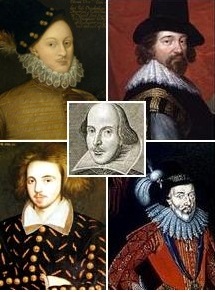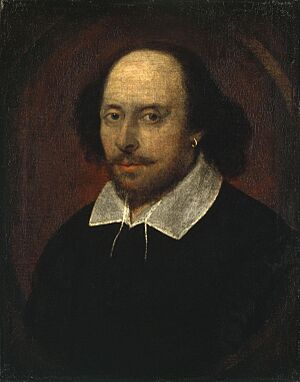History of the Shakespeare authorship question facts for kids
Have you ever wondered if someone else wrote the famous plays and poems by William Shakespeare? For a long time, everyone believed that William Shakespeare of Stratford-upon-Avon wrote all the works we know today. People even called him a "godlike genius."
But in the 1800s, some people started to wonder if this was really true. They thought that maybe the person from Stratford didn't have the right background to write such amazing and deep stories. These people are called "anti-Stratfordians."
Those who believe William Shakespeare of Stratford-upon-Avon was the true writer are called "Stratfordians." This article will explore some of the ideas about who else might have written Shakespeare's works.
Contents
Who Really Wrote Shakespeare's Plays?
The idea that someone other than William Shakespeare wrote his famous works first came up in the 1800s. Before then, no one seemed to question his authorship. Many experts today still believe there's no real proof that anyone doubted him before the 19th century.
As Shakespeare's fame grew, some people felt uneasy. They thought the known facts about his life didn't match his amazing reputation as a writer. This feeling led to new theories about who the real author might be.
Delia Bacon and the First Group Theory
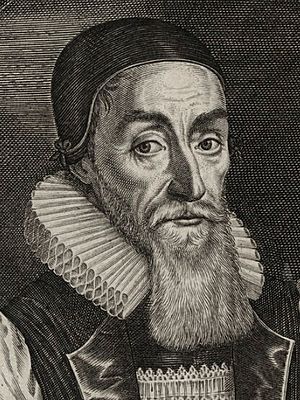
In 1853, an American teacher named Delia Bacon traveled to Britain. She believed that Shakespeare's plays were written by a secret group of smart politicians. She thought they used the plays to share advanced ideas about politics and philosophy.
She believed that Francis Bacon (no relation to Delia) was the main thinker behind these ideas. Delia Bacon argued that Shakespeare of Stratford couldn't have written such deep plays. She thought they must have come from a great, unknown mind.
Francis Bacon as a Possible Author
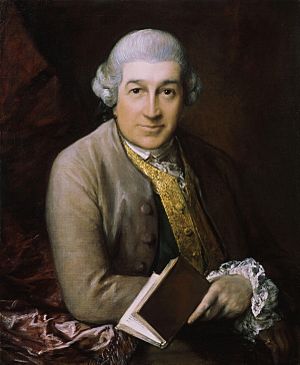
Soon after Delia Bacon's ideas, some people suggested that Francis Bacon himself was the sole author. In 1856, William Henry Smith wrote a letter saying he believed Francis Bacon wrote the plays. This idea became very popular, especially in America.
Some people even claimed to find secret codes in Shakespeare's works that revealed Bacon as the hidden author. However, expert code-breakers later showed these codes were not real.
A new idea came up later: some writers claimed Francis Bacon was the secret son of Queen Elizabeth I. They said this explained why he would want to keep his authorship a secret. They believed his plays contained a hidden history of the Tudor era, showing his tragic life story.
Other Early Candidates for Authorship
In 1891, an archivist named James H. Greenstreet found letters that mentioned William Stanley, 6th Earl of Derby, was "busy penning plays for the common players." Greenstreet suggested that Derby was the real hidden author.
Later, an American writer named Robert Frazer supported this idea. He argued that William Shakespeare, the actor, simply helped put on plays written by more important authors. Frazer believed Derby was the main writer behind Shakespeare's plays, including the sonnets and poems. He concluded that "William Stanley was William Shakespeare."
The poet and playwright Christopher Marlowe was also suggested as a possible author. In 1892, T.W. White proposed Marlowe as part of a group of writers. By 1895, Wilbur G. Zeigler expanded this theory, suggesting Marlowe was the main writer of the group.
New Candidates in the 20th Century
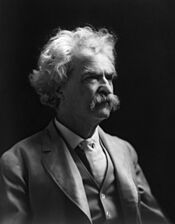
After Marlowe, another candidate was Roger Manners, 5th Earl of Rutland. Supporters of Rutland argued that the plots of the plays seemed to match details from his own life. This idea, linking a candidate's life to the plays, became very important for future theories.
In 1918, Professor Abel Lefranc, a well-known expert, published detailed arguments for the Earl of Derby as the author. Many people were impressed by his research, and a lot of writings supported Derby's claim.
The Oxford Theory
In 1920, an English schoolteacher named John Thomas Looney published a book called "Shakespeare" Identified. In it, he suggested a new candidate: Edward de Vere, 17th Earl of Oxford. This theory quickly gained many supporters, including the famous psychologist Sigmund Freud.
Over time, the Baconian theory (about Francis Bacon) became less popular. Instead, interest grew in Derby and Oxford as possible authors. The Oxfordian theory, especially after a book by Charlton Ogburn in 1984, became the most popular alternative theory about Shakespeare's authorship.
Since then, many other people have been suggested as authors. These include Shakespeare's wife, Anne Hathaway, and many other scholars, nobles, and poets. New candidates are still being suggested regularly.
Academic Views on the Question
In 2007, a survey asked Shakespeare teachers about the authorship question. About 6% said there was "good reason to question" Shakespeare's authorship, and another 11% said it was "possible." When asked if they mentioned the question in their classes, 72% said "yes."
However, most teachers (61%) felt it was "A theory without convincing evidence." About 32% called it "A waste of time and classroom distraction."
Even so, some groups are trying to encourage more research into the question. In 2007, the Shakespeare Authorship Coalition started a "Declaration of Reasonable Doubt" to encourage new studies. More than 3,000 people, including over 500 academics, have signed it. Some universities have even offered programs or research centers dedicated to the Shakespeare authorship question.
Non-English Candidates for Authorship
Some theories don't just suggest a different author, but an entirely different background for Shakespeare himself. For example, some have claimed he was an Arab whose real name was "Sheikh Zubayr." This idea started as a joke in the 1800s but was later taken seriously by an Iraqi writer in the 1960s.
The idea that Shakespeare might not have been English also came up in Germany. During a time when Shakespeare was very popular there, some Germans claimed he was actually German in spirit and culture.
In 1897, George Newcomen suggested Shakespeare was Irish, perhaps a man named Patrick O'Toole. Later, Thomas Fingal Healy claimed that many of the plays used Irish folklore. He thought Shakespeare hid his Irish background because the Irish were seen as rebels by Queen Elizabeth I. Another historian, Elizabeth Hickey, even claimed in 1978 that the Irish rebel William Nugent was the true Shakespeare. She said his works contained many Irish phrases.
Sigmund Freud also wondered if Shakespeare was not English. He thought the famous Chandos portrait of Shakespeare showed features that looked Italian. Based on a suggestion, Freud even suspected Shakespeare might have been French, and his name a changed version of "Jacques Pierre."
The idea of an Italian author for Shakespeare's works also gained attention. Some suggested Michelangelo Florio or his son John Florio. This theory often points out that Shakespeare's plays show a deep knowledge of Italian culture and places. One theory claimed that Michelangelo Florio wrote the works in Italian, and his son John translated them into English.
Another Italian candidate was proposed in the 1930s, though his name was unknown. This theory claimed the author was the secret child of an Italian noble family, educated in Florence, who later became a playwright in England. The idea that Emilia Lanier was the author is also linked to her Italian family background, with the added claim that she was Jewish. Supporters argued that only someone with her unique background could have written the plays.
Images for kids
-
Poet Walt Whitman wondered if the author of Shakespeare's historical plays was "one of the 'wolfish earls' so plenteous in the plays themselves."
 | Laphonza Butler |
 | Daisy Bates |
 | Elizabeth Piper Ensley |


